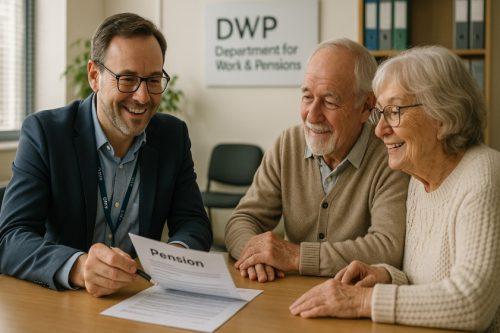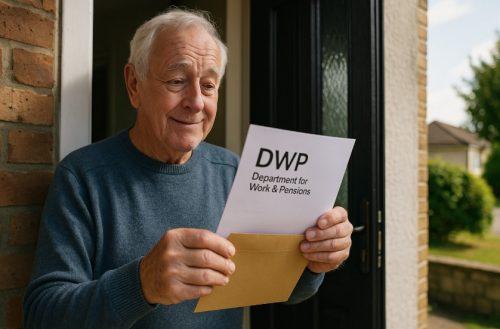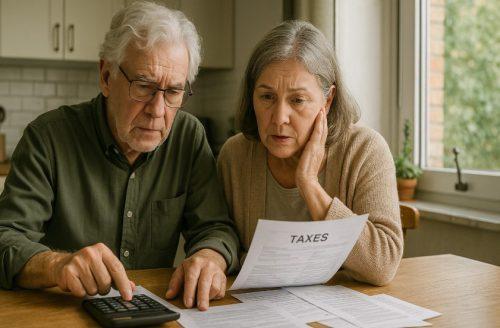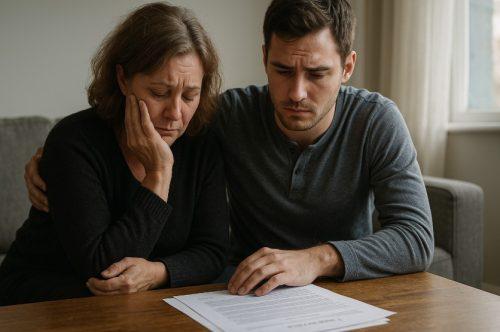|
Getting your Trinity Audio player ready...
|
Have you ever wondered if you or someone you know might be owed thousands of pounds in unpaid pension benefits? The Department for Work and Pensions (DWP) has recently issued a critical update concerning State Pension underpayments, and it’s turning heads across the UK.
This announcement isn’t just another policy shift, it’s a financial lifeline for many retired individuals who were unknowingly short-changed for years. The DWP’s correction programme is now underway, aiming to address longstanding errors that affected thousands of pensioners, especially women, widows, and those over 80. If you’re one of them, this update could mean a substantial lump sum is coming your way.
In this guide, we’ll break down everything you need to know: who qualifies, how much you might receive, how the DWP identifies these underpayments, and what to do next if you believe you’ve been affected.
What Is the DWP Pension Back Payment Update All About?

The DWP’s latest pension back payment update is part of a major correction programme designed to repay UK pensioners who were underpaid their State Pension due to administrative errors, outdated systems, and overlooked entitlements.
This move is not just about compensation, it’s about correcting decades of financial injustice. Many of the affected pensioners had no idea they were owed money.
In some cases, these errors date back decades. The government has acknowledged the problem, and the DWP is taking steps to put it right. The correction programme is one of the most extensive reviews of State Pension records ever undertaken in the UK.
Here’s what the update involves:
- A large-scale review of millions of pension records
- Automatic detection of underpayments using new system tools
- Prioritisation of cases involving vulnerable groups such as widows and those over 80
- Outreach to affected pensioners through official letters from the DWP
- Ongoing efforts with a target to complete reviews by the end of 2025
This initiative is expected to result in over £1.2 billion being repaid. The correction isn’t automatic for everyone, so it’s essential to check if you might be entitled to a back payment.
The DWP aims to correct historical wrongs while preventing future occurrences. For many pensioners, this means long-overdue financial relief is finally on the horizon.
Who Qualifies for Pension Back Pay from the DWP?
Not every pensioner will be eligible for a back payment, but certain groups have been prioritised due to consistent underpayments. The DWP is focusing on individuals whose entitlements were overlooked, often because of outdated systems or gender-based rules.
The main groups identified include:
- Married women who received less than 60% of their husband’s basic State Pension
- Widows who should have received a pension increase after their husband’s death but did not
- Over-80s who became entitled to a higher pension rate after their 80th birthday but were missed
Eligibility often hinges on outdated policies that failed to recognise certain entitlements. For example, some women were supposed to receive an uplift based on their husband’s contributions but were never reassessed after his retirement or death.
The DWP is proactively contacting those affected. However, if you belong to any of these groups and haven’t heard from the DWP, it’s worth checking your pension records.
It’s important to note that:
- You don’t need to apply if you’re already identified in the system
- If unsure, you can contact the Pension Service to check eligibility
- Documentation like your National Insurance number will help confirm your case
If you fall into these categories, the DWP may owe you a significant sum. Taking action now ensures you don’t miss out on what you’re rightfully entitled to.
How Does the DWP Identify and Review Underpayments?
To ensure that no pensioner is left behind, the DWP has launched an extensive review programme to identify underpayments across the State Pension system. This initiative involves advanced systems and manual reviews to detect discrepancies.
Here’s how the process works:
- Automatic Record Checks: The DWP is scanning millions of pension records to identify inconsistencies and missed entitlements. These checks are mostly system-driven and cover several decades of data.
- Cross-Referencing with National Insurance Records: Each individual’s pension amount is matched against their National Insurance (NI) contributions. Discrepancies are flagged for further investigation.
- Updated System Tools: New algorithms and audit tools have been implemented to detect anomalies that older systems previously missed.
- Manual Verifications: Where system checks raise questions, manual audits by DWP officers are conducted to ensure accuracy.
- Outreach and Notification: Pensioners identified as underpaid are sent letters explaining the issue, the correction, and the amount they will receive.
You don’t have to do anything to trigger a review if you’re already in the system. But if you believe you’ve been underpaid and haven’t been contacted, reaching out to the Pension Service is recommended. These steps show the DWP’s commitment to transparency and fairness while addressing past mistakes in the State Pension system.
Why Were UK Pensioners Underpaid in the First Place?
Pension underpayments aren’t a new problem. They stem from a range of issues, primarily due to outdated administrative systems, complicated pension rules, and human error. The current review shines a light on just how systemic the issue has been.
Here’s why it happened:
- Outdated IT Systems: Many of the problems arose because the systems in place failed to apply automatic uplifts when certain events occurred, such as a spouse passing away or a pensioner turning 80.
- Complex Pension Rules: Rules affecting married women were especially complicated. Many women’s pensions depended on their husband’s National Insurance contributions, and automated updates were often missed.
- Manual Processing Errors: In a system reliant on human intervention, mistakes were inevitable. Incomplete or incorrectly processed information led to missing entitlements.
The consequences have been far-reaching:
- Many pensioners lived on less money than they were entitled to for years
- Some were forced to dip into savings or rely on additional government support
- Thousands didn’t realise their financial difficulties were due to underpayments
The underpayment issue is not just a clerical error, it’s a breach of trust in the pension system. The government’s correction programme is a necessary but long-overdue response to these systemic problems.
How Much Can You Expect from a DWP Pension Back Payment?
The amount you could receive depends on your specific circumstances, including how long you were underpaid and which eligibility group you fall into. The DWP has disclosed that some pensioners have received tens of thousands in back payments.
Here are the typical payment amounts by group:
- Married women: Average payments range from £6,000 to £8,000. In some cases, payments have exceeded £12,000 due to long-term underpayments.
- Widows: Average repayments fall between £10,000 and £15,000, with some cases topping £30,000 for those who missed out on their husband’s full pension.
- Over-80s: Payments usually range from £3,000 to £5,000, though exceptional cases have seen up to £9,000.
These amounts reflect not only financial restitution but also the impact of delayed justice.
Below is a comparative table for better clarity:
| Pensioner Group | Average Back Payment | Highest Reported Payment |
| Married Women | £6,000 – £8,000 | Up to £12,000 |
| Widows | £10,000 – £15,000 | Over £30,000 |
| Over-80s | £3,000 – £5,000 | Up to £9,000 |
It’s important to remember that these figures vary based on the individual case. If you suspect an underpayment, seeking clarity from the DWP could result in life-changing financial recovery.
When Will You Receive the Backdated Pension Payments?

The DWP is actively processing underpayment cases, but due to the scale of the issue, payments are being made in phases. If you’re eligible, you may already be in the system, or you may be contacted soon.
DWP Review and Payment Timeline (Up to 2025)
The DWP has committed to completing this review programme by the end of 2025. With millions of pension records to review, they are proceeding methodically to ensure accuracy.
- The review started in 2021 and is ongoing
- High-priority groups such as widows and women over 80 are being reviewed first
- The process is expected to be fully completed by late 2025
How Notification and Payments Are Made?
If you’re identified as underpaid, you’ll receive a formal letter from the DWP explaining:
- The reason for your underpayment
- How much you’re owed
- When and how the money will be paid
Most payments are made within a few months after notification.
What to Do While Waiting?
While waiting for your review:
- Ensure your contact details are up to date with the DWP
- Review your pension statements and compare with published entitlements
- Keep an eye out for letters from the DWP
- Contact the Pension Service if you believe you’re eligible but haven’t been contacted
Remaining proactive during the wait period could help avoid delays. Patience is essential, but preparation is equally important.
Can You Check If You’re Owed a Back Payment?
Although the DWP is reviewing records and contacting people automatically, you don’t have to wait if you suspect you’ve been underpaid. You can take steps to check if you’re eligible for a back payment and ensure you’re not missing out.
Here’s what you can do to confirm your entitlement:
- Call the Pension Service: The most direct way to begin is by contacting the official helpline. A representative can initiate a review of your case if you meet the criteria.
- Provide Your National Insurance Number: This will help the DWP verify your records and match your entitlement against historical payment data.
- Review Your Pension Statements: Compare what you’re receiving to the current and historical State Pension rates. If something doesn’t add up, it could indicate an error.
- Use Online Tools or Calculators: Some official and third-party tools can help give you an idea of what your pension amount should be.
- Speak to a Specialist: If things are unclear, professionals like pension advisers or financial consultants can help check your records and identify any discrepancies.
Support is available from:
- Age UK: Offers pension advice and support, especially for older adults.
- Citizens Advice: Helps explain your rights and navigate DWP processes.
- Pension Advice Services: Independent advisers can review your full pension history.
Don’t wait passively. Taking action now could mean recovering thousands in missed payments.
Are DWP Pension Back Payments Taxable in the UK?

Yes, many pensioners are surprised to learn that DWP back payments may be subject to tax, depending on how and when they are paid. Understanding your tax obligations is key to avoiding surprises.
Here’s how it works:
- Lump Sums Are Taxable: If you receive a large back payment in a single tax year, it may be counted as additional income, which could push you into a higher tax bracket.
- Tax Relief May Be Available: In some cases, you can spread the tax liability across previous years if HMRC agrees the payment was owed from earlier tax periods.
- Check With HMRC: It’s essential to contact HMRC to get advice on how your specific payment will be taxed. Every case is different, especially for large amounts.
- Unexpected Tax Bills: A £10,000 back payment, for example, could lead to a temporary increase in your tax band, meaning a portion of the payment could be taxed at a higher rate.
To reduce financial stress:
- Consult a Tax Adviser: They can help you legally minimise your tax burden and guide you through the process of requesting a tax adjustment if needed.
- Keep All Documentation: Retain any correspondence from the DWP and HMRC regarding your payment for future reference.
Being proactive about your tax obligations ensures your back payment works in your favour.
How Do Back Payments Affect Other Benefits Like Pension Credit?
If you receive a back payment from the DWP, it might impact other benefits you currently receive, especially those that are means-tested. This is an area that catches many pensioners off guard. Understanding how benefits could be affected is critical.
Impact on Means-tested Benefits
Some common benefits that may be impacted include:
- Pension Credit: A sudden increase in savings could push your total assets above the eligibility threshold, causing a reduction or even loss of the benefit.
- Housing Benefit: Since this is calculated based on income and savings, a lump sum could result in lower support.
- Council Tax Support: An increase in your financial resources may reduce the amount of discount or assistance you receive.
How Savings/Income Thresholds May Be Affected?
Even if your lump sum was earned in the past, it is usually counted as income or capital in the year it’s paid.
This could mean:
- You temporarily exceed the savings threshold
- Your weekly income appears higher, reducing or stopping payments
This doesn’t mean you shouldn’t accept the payment, but you should prepare for the potential changes.
What Pensioners Can Do to Minimise Benefit Loss?
- Report Your Payment Promptly: Inform the DWP or your local authority as soon as you receive the money.
- Seek Advice Immediately: Use Citizens Advice or Age UK to understand how your benefits may change.
- Ask About Disregards: In some cases, especially if the payment relates to a past period, it may be disregarded for benefit calculations. Knowing this can help you keep your entitlements intact.
Understanding these nuances ensures that your back payment doesn’t come with unexpected reductions in other support.
What Should You Do With a Large Lump Sum Payment?
Receiving thousands of pounds in backdated pension payments can feel overwhelming. It’s a financial opportunity, but only if handled wisely. Planning what to do with the money is essential.
Here are some smart steps to consider:
- Clear Outstanding Debts: If you have any credit card balances, personal loans, or other debts, using your lump sum to clear them can bring peace of mind and improve your financial security.
- Set Aside Emergency Funds: Consider putting part of the money into a separate account to cover unexpected healthcare, home repairs, or rising energy bills.
- Save Safely: Use a government-backed savings account, like an ISA, to protect your money while earning interest.
- Review Investment Options: If the amount is large and you don’t need immediate access, speak to a financial adviser about low-risk investment products.
Why financial advice is important?
- Budgeting Guidance: Professionals can help you allocate your lump sum in a way that ensures it lasts longer.
- Tax Planning: Proper advice can help you minimise tax liabilities on your payment.
- Maximising Growth: An adviser may suggest safe ways to grow the sum without exposing you to unnecessary risk.
Using your lump sum wisely could transform your financial future well beyond just catching up.
What Happens If a Pensioner Dies Before Receiving Payment?

Sadly, some pensioners may pass away before the DWP completes their back payment review. However, these payments don’t disappear, they can still be claimed by the person’s estate or surviving family.
Here’s how the process works:
- Estate Entitlement: If a pensioner dies before receiving their back payment, the money becomes part of their estate.
- Spouses and Civil Partners: These individuals may be entitled to receive the payment directly, especially if it was based on joint pension records.
- Family Heirs and Children: If the pensioner didn’t have a surviving spouse, payments could go to their children or other next of kin, depending on inheritance rules.
To claim the money:
- Notify the DWP: Contact the Pension Service with the deceased’s information, including full name, date of birth, and National Insurance number.
- Provide Legal Documentation: Submit a copy of the death certificate and proof of your relationship to the deceased.
- Follow Probate or Will Instructions: If there is a will, the payment is distributed accordingly. If not, intestacy rules apply.
The key is to act swiftly and ensure all necessary paperwork is submitted. This ensures the financial justice still reaches the right people—even posthumously.
What Can You Do If Your Pension Back Pay Claim Is Refused?
If you believe you were underpaid and your claim is denied, don’t give up. You have legal rights and several steps you can take to appeal the decision or have your case reviewed again.
Here’s what you should do:
- Request a Mandatory Reconsideration: This is the first step in the appeal process. The DWP will re-examine your case and check for mistakes.
- File a Formal Complaint: If the reconsideration doesn’t resolve your issue, you can file a complaint through the DWP’s internal complaints process.
- Contact the Independent Case Examiner (ICE): This is an impartial reviewer who looks into unresolved complaints against the DWP.
- Reach Out to the Parliamentary and Health Service Ombudsman: If ICE can’t help, you may escalate your case to the Ombudsman for an independent investigation.
Additional legal routes include:
- Appealing to a Tribunal: You can have your case heard by an independent panel if internal routes fail.
- Seek Legal Advice: In complex or high-value cases, consulting a solicitor who specialises in pensions can provide clarity and support.
Don’t accept a denial if you feel it’s unfair. Knowing your rights empowers you to challenge the system effectively.
How Is the Government Preventing Future Pension Errors?
The DWP’s back payment programme is more than a short-term correction, it’s a wake-up call for long-term reform. The government has acknowledged past mistakes and is now working to ensure history doesn’t repeat itself.
Here are the measures being taken:
- Full Audit of Pension Records: Millions of files are being systematically reviewed to catch any other missed payments or errors.
- Compensation Programmes: Over £1.2 billion has already been repaid, and the total is expected to grow as more cases are identified.
- Upgraded Systems: The DWP is investing in modern software to replace outdated platforms that failed to recognise automatic pension increases.
- Enhanced Training for Staff: Pension officers are receiving updated training to correctly apply rules and spot errors.
- Gender Rule Reviews: There’s a push to simplify and modernise how women’s pensions are calculated, to avoid dependency on their spouse’s NI record.
These actions mark a step towards a fairer and more transparent pension system. While challenges remain, the government appears committed to ensuring accuracy, accountability, and trust in future pension management.
Conclusion
The DWP’s update on back paying pensioners in the UK is not just a technical correction, it’s a moment of financial justice for thousands who were quietly short-changed for years. With billions already being repaid and reforms underway, this programme offers hope and healing for affected pensioners.
If you or someone you know may qualify, now is the time to act. Check your entitlement, ask questions, and ensure your retirement income reflects what you’re truly owed. The government’s progress is promising, but your awareness is your strongest asset.
FAQs
How do I know if the DWP owes me back pension payments?
You can contact the Pension Service with your National Insurance number. The DWP is also automatically contacting eligible pensioners.
Will the DWP automatically pay backdated pensions?
Yes, the DWP is reviewing records and paying pensioners without needing them to apply. However, contacting them can speed up the process if you’re unsure.
How far back can State Pension underpayments be claimed?
The DWP is correcting pension records going back several decades. This depends on the start date of your entitlement.
Are pension back payments included in means-tested benefits?
Yes, back payments can affect Pension Credit and other benefits. You should notify the DWP and seek advice before spending the lump sum.
Can you appeal if the DWP refuses a pension back payment?
Yes, you can request a mandatory reconsideration or escalate to an ombudsman. Independent advice services are also available to help.
What documents are needed to claim for a deceased relative?
You’ll need a death certificate and proof of relationship. The DWP will advise you on the full list of requirements during the process.
Are DWP back payments taxed automatically?
Yes, back payments are taxed in the year they’re paid. Tax relief options may apply if payments cover previous tax years.








